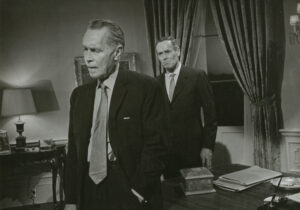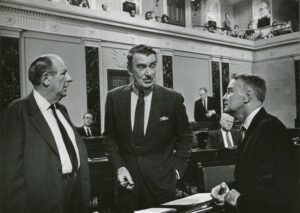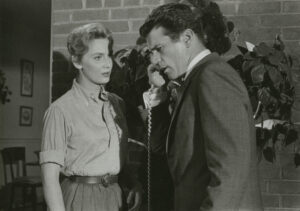by Barb Lentz.
The five movies Bob provided me from which to choose were these:
Advise and Consent (1962)
California Suite (1978)
Hold Your Man (1933)
The Lusty Men (1952)
Tex (1982)
I nearly chose Hold Your Man because of its stars, Jean Harlow and Clark Gable, but the political turmoil of Advise and Consent seems much more timely, and it has an even greater cast. I have heard of the book, and Bob says it is one of the best books he has ever read. So I chose Advise and Consent.

Advise and Consent is a political drama surrounding a president’s controversial candidate for Secretary of State. The nominee, Robert A. Leffingwell (Henry Fonda), is a liberal “egghead” whose policies of international appeasement do not appeal to many of the conservative elements of the Senate, the Congressional body which needs to either deny or confirm his appointment. Leading the pack on the president’s side are Senate Majority Leader Bob Munson (Walter Pidgeon), Senator Danta (Paul Ford), and especially Senator Fred Van Ackerman (George Grizzard), whose aggressiveness exasperates his more commodious colleagues. Standing firm against the nomination is Senator Seeb Cooley (Charles Laughton), whose personal antagonism toward Leffingwell is well known. Having to moderate the debate between the two sides is young Senator Brigham Anderson (Don Murray), who is squeezed unmercifully by both sides as Leffingwell’s character and questionable past come into sharp focus.
The first part of the story sets a political whirlpool in motion around Leffingwell: the President (Franchot Tone) is ill and wants his nominee affirmed quickly; the majority party (not named but certainly the more liberal of the two) wants to stand behind their president but some in their ranks question the nominee; the minority party (not named, but certainly the more conservative of the two) rallies behind Cooley, whose distaste of the nominee pushes him into more underhanded action than usual; a mysterious man from Leffingwell’s past (Burgess Meredith) sets the Senate committee meeting ablaze with controversy; Leffingwell perjures himself and tries to cover his tracks; Van Ackerman takes it upon himself to pressure Anderson to speedily confirm Leffingwell.
The second part of the story is more personal, exposing the pressure being put on Anderson and his inability to withstand it. This tragic aspect slowly and surely overwhelms the political material, conveying genuine power and emotion as the only really innocent person in the situation is compromised and persecuted for trying to do the right thing. The result is suspenseful and heartbreaking, and it all could have been avoided had others done the right thing, or if Brig himself had been able to share a controversial aspect of his past with the friends who could have helped to protect him.
As a society we seem even more divided now than during the era of this movie, but it yet gives us hope. The men (there are just two women in the Senate, one of whom is played by Betty White, making her film debut) have opposing views on things, but at least they are civil to each other, and downright nice at times. Before the climactic vote on Leffingwell, they are even chivalrous. I think we could learn a lot from watching how these characters respect each other, even though they have different perspectives on life.
My top five aspects of the movie are:

1. The qualities of the cast. Lots of good, quality actors are present and acquit themselves with dignity. From Henry Fonda to Betty White, the acting is uniformly strong, with Charles Laughton (in his last film) and Walter Pidgeon being exceptional.
2. The truth about politics, which is that every important decision is beset by personal favoritism or animosity rather than rational thought. Politicians should be concerned primarily with the good of the country, and only secondarily with party interests or local advantage. This movie portrays the political world very truthfully, at least as it existed sixty years ago.
3. On the other hand, political maneuvering is interesting, sometimes fascinating. It’s remarkable how arms are tugged, twisted and sometimes broken by people in power to get things done, such as a nominee being accepted or rejected, often for reasons having nothing to do with their qualifications or achievements. Politics is really just judging whether the people elected or appointed are considered to be worthy or not and then controlling the purse strings.
4. Perspectives of the characters. There are so many people in positions of power whose perspectives on their positions conflict with others. Consider the Vice President, Harley Hudson (Lew Ayres), seen by most of the Washington D. C. crowd as weak and wishy-washy. We see his own humility at the thought of being president, yet also see how he is girding himself for the challenge and gradually rising to it. Van Ackerman has the president’s interests in mind, but is tactless and boorish, and pushes Brig too far.
5. I was annoyed at Brig Anderson being unable to confide in his wife (Inga Swenson). How is this a positive aspect? Because it is real. Too many people are unable or unwilling to communicate with those close to them, even when their lives may depend on it. This is a perfect example. Brig has opportunities to unload his anxieties to his wife, to Bob Munson, to Seeb Cooley, even to the Vice President, but always fails to do so, and he pays a heavy price for that decision. Yet it is real, as proven by real life. We all know people who, for whatever reason, refuse to open up to others, even when it could save them all sorts of pain.

Is Advise and Consent a classic? Yes, I think it is. I’ve never seen a better political drama, especially one where the final irony of the story leaves everything that has occurred over the last two hours completely moot. Director Otto Preminger has done an excellent job of mixing timely political messaging with nice location filming, strong human drama and a nostalgic view of the country as it was. I appreciate how the controversial elements were mixed into the story without overwhelming it and the sprinkling of enough real elements and people to make it seem perfectly believable and convincing. I’m glad I saw it.
BRL. 22 February 2022.
Advise and Consent (June 6, 1962) Otto Preminger Films / Alpha Alpina / Columbia Pictures
Produced and Directed by Otto Preminger.
Screenplay by Wendell Hayes.
Principal Cast (character, performer):
Robert A. Leffingwell Henry Fonda
Senator Seabright (Seeb) Cooley Charles Laughton
Senator Brigham (Brig) Anderson Don Murray
Senate Majority Leader Bob Munson Walter Pidgeon
Senator Lafe Smith Peter Lawford
Dolly Harrison Gene Tierney
The President Franchot Tone
Vice President Harley Hudson Lew Ayres
Herbert Gelman Burgess Meredith
Johnny Leffingwell Eddie Hodges
Senator Stanley Danta Paul Ford
Senator Fred Van Ackerman George Grizzard
Ellen Anderson Inga Swenson
Senate Minority Leader Will Geer
Senator Bessie Adams Betty White
Senator Orrin Knox Edward Andrews
Senator Tom August Malcolm Atterbury
139 minutes. Black and White. Not Rated.
